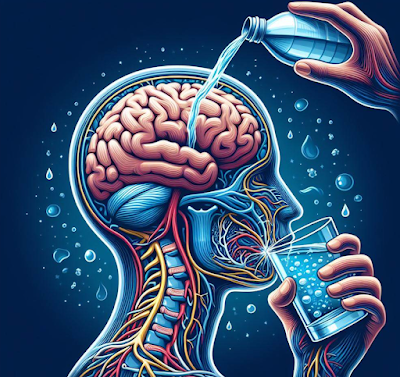Attaining a sound mental well-being involves modifying your lifestyle, particularly in terms of sleep, stress management, and dietary choices. Instead of merely aiming for the bare minimum of sleep required to navigate the day, it is crucial to prioritize the optimal amount. Adults should aim for a minimum of 7.5 hours of sleep per night, with up to 9 hours being even more beneficial.
Unlocking Cognitive Potential - The Impact of Quality Sleep on Memory and Functionality
Insufficient sleep significantly diminishes our capacity to function effectively, and there is no possibility of making up for lost sleep later. The ability to solve problems, make decisions, and, of course, maintain good memory is contingent upon the amount and quality of sleep one receives. It is essential that the sleep be of good quality, emphasizing that it's not merely about the duration in hours.
Research indicates that for efficient memory consolidation, adequate sleep is crucial. The primary activities that enhance memory function occur during the deep stage of sleep at night. Failing to reach this crucial stage means that these memory-boosting activities won't take place.
Optimizing Sleep Habits - A Guide to Enhancing Your Sleep Schedule
Establishing a consistent sleep routine is crucial for overall well-being. Aim to wake up and go to bed at the same time every day, maintaining this schedule even during vacations and weekends. This regularity contributes to better-quality sleep.
If you're facing difficulty sleeping, there are various strategies to address the issue. In today's digital age, electronic devices can significantly impact our ability to sleep. Consider turning off devices such as computers, phones, and televisions to improve your chances of falling asleep.
Fueling Your Mind - Dietary Choices for Brain Health
Making mindful dietary choices not only benefits your body but also plays a significant role in maintaining a healthy brain. Consider incorporating the following foods into your diet for improved memory:
- Whole grains
- Vegetables and berries
- Nuts
- Legumes
- Turkey and chicken
- Herbs and spices
- Olive oil
- Coconut oil
- Red wine (moderate intake)
- Fatty fish such as sardines and salmon
Fatty fish like sardines and salmon contain essential omega-3 fatty acids, crucial for the creation of nerve and brain cells. These acids are vital for effective learning and enhanced memory. Research suggests that individuals who omit these foods from their diet may face a higher risk of cognitive function decline.
Be cautious about the following foods, either avoiding them or significantly reducing their intake:
- Processed foods
- Sugar
- Red meat
- Butter
- Salt
- Cheese
- Fried foods
The Impact of Fat and Sugar on Memory - A Dietary Connection
Recent studies have linked high fat and sugar consumption to poor memory, particularly in regions where the Western diet, rich in both fats and sugars, prevails, showing a clear impairment in memory function.
If incorporating fatty fish like sardines or salmon isn't appealing, several alternative foods provide excellent sources of omega-3 fatty acids, including:
- Walnuts
- Winter squash
- Broccoli
- Seaweed
- Flaxseed oil and ground flaxseed
- Pumpkin seeds
- Pinto and kidney beans
- Soybeans
Maintaining a diet rich in vegetables and fruits, especially green leafy vegetables, is essential for preserving brain health and preventing cell damage. Opt for colorful fruits and vegetables, as the vibrancy indicates a higher nutritional value.
Hydration and Memory - The Role of Water and Coffee
Ensuring an adequate water intake is not only beneficial for the brain and spinal cord, serving as a shock absorber for these vital organs, but it's also crucial for preventing brain damage and maintaining optimal memory function. Surprisingly, moderate coffee consumption can also contribute positively to memory, as long as it is not excessive.
Additionally, it's important to be aware that certain medications can impact memory. However, the key is to consistently follow the prescribed dosage as advised by your general practitioner. Abruptly stopping certain medications without professional guidance can pose risks. If you are prescribed medications for anxiety, antidepressants, sleeping tablets, hypertension, or Metformin, engage in a discussion with your doctor to explore alternative approaches for managing your health.
Health Conditions and Cognitive Function - Impact on Memory
Several medical conditions can influence cognitive function and memory. Conditions such as heart disease, often associated with high blood pressure and high cholesterol, have been linked to mild cognitive impairment. Diabetes is another ailment believed to elevate the risk of developing cognitive impairment.
Certain hormone deficiencies, including those of estrogen, testosterone, and thyroid hormones, can contribute to issues with memory, thinking, and confusion.
Stress has emerged as a primary threat to well-being in many societies, not only due to its increased prevalence but also because of inadequate stress management. Stress triggers the release of cortisol, a stress hormone known to impair memory processes, particularly affecting the efficiency of long-term memory. Addressing stress is crucial for preserving cognitive health.
Stress Management for Brain and Body Health - Tips and Techniques
Effectively managing stress is essential for both brain and body health. Here are some helpful tips to combat stress:
- Ensure Regular Breaks: Take breaks throughout the day to refresh your mind.
- Set Realistic Expectations: Make expectations achievable to reduce unnecessary stress.
- Learn to Say No: Be willing to decline additional commitments when necessary.
- Express Emotions: Talk about your emotions and worries with someone you trust.
- Maintain Work-Life Balance: Strive for a balance between work and leisure activities.
- Avoid Multitasking: Focus on one task at a time to enhance efficiency.
- Learn Meditation Techniques: Explore meditation as a tool for managing stress.
Meditation, particularly mindfulness meditation, proves valuable in managing various medical and mental health conditions while improving concentration, focus, learning, and memory. Studies indicate an increase in the thickness of the cerebral cortex during meditation, enhancing brain cell connections and boosting memory and mental acuity.
By incorporating mindfulness meditation into your routine, you can effectively manage anxiety, sleep issues, stress, depression, and overall mental and physical health. Regular practice can help eliminate factors that may negatively impact your memory.
Embracing Mindfulness Meditation -A Practice for Present Living
Mindfulness involves being fully present in the moment, directing your focus to the 'now' rather than dwelling on the future. This practice allows you to acknowledge your thoughts, feelings, and sensations without passing judgment.
Various mindfulness meditation techniques exist, with a common foundation of combining breath awareness with mindfulness of the mind and body. While it may sound intricate initially, it is a simple practice that, once mastered, prompts reflection on why it hadn't been tried sooner.
No specialized equipment or settings are required for mindfulness meditation. All you need is a comfortable place to sit, a non-judgmental mindset, and a few minutes of your time. It's a straightforward yet impactful practice that can be easily incorporated into your daily routine.
Incorporating Mindfulness into Your Routine
Select a time of day when interruptions are less likely, acknowledging that daily life may disrupt consistency. If missed, strive to practice the next day.
Identify a comfortable spot at home, whether on a chair or the floor. Maintain a straight back without adopting a rigid posture.
Concentrate on your breath, the inhalation and exhalation process. Inhale through your nose and exhale through your mouth. While thoughts may enter your mind, acknowledge them without dismissal. Take note and redirect your focus back to your breathing.
Cultivating Mindfulness Through Meditation and Daily Activities
Engaging in the practice of mindfulness involves actively noting thoughts and feelings, while consistently returning to the focal point of your breath—a key element in this form of meditation. This deliberate awareness of the present moment is the essence of mindfulness meditation.
Mindfulness need not be confined to dedicated meditation sessions; it can be seamlessly woven into your daily routine. As you go about seemingly mundane tasks, such as brushing your teeth, take a moment to feel the connection between your feet and the floor. Observe the sensation of holding a toothbrush and the rhythmic motion of your arm as you brush. Similarly, when washing dishes, pay attention to the sensory experience—how the water feels on your hands, the visual aesthetics of bubbles, and the sounds created by the dishes meeting in the sink.
Mindfulness meditation can be introduced into various aspects of your life, and the benefits for your mental well-being are profound. The examples provided here merely scratch the surface of the subject. Explore additional information and techniques to discover the myriad ways mindfulness can enhance your overall mental health and quality of life.





Post a Comment for "Mastering the Art of Mindful Living - A Comprehensive Guide to Enhancing Mental Well-being through Sleep, Diet, and Mindfulness Meditation"